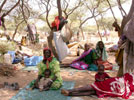
The most positive news coming out of Sudan this week was that the Doctors Without Borders, or MSF, staff members kidnapped on Wednesday have been released. MSF confirmed the reports on Saturday night, identifying the staff members as Canadian nurse Laura Archer, Italian doctor Mauro D’Ascanio, French coordinator Raphaël Meunier and Sudanese watchman Sharif Mohamadin.
Christopher Stokes, the director of MSF’s Belgian team, said, “This kidnapping represents a significant escalation in the insecurity faced by aid workers in Darfur,” a point that many speculate could be part of Khartoum’s strategy to increase suffering in Darfur, intimidate international aid organizations, and punish the aid agencies Bashir accuses of collaborating with the ICC. The Sudanese government denied involvement and condemned the kidnapping, but such denials are not very credible in the current environment. MSF says it will “drastically reduce” its presence in Darfur. Stokes again:
We are incredibly saddened by this, particularly as in many areas we were the only healthcare provider. The needs of the population in Darfur are immense and they are the people who continue to suffer.
Across Sudan, the practical implications of President Bashir’s backlash against the ICC arrest warrant began to unfurl. Given just days to depart, the 13 humanitarian aid organizations expelled by Khartoum began to evacuate staff, leaving some of the camps for internally displaced Sudanese entirely without services. The U.N. estimates that 4.7 million people rely on aid in Darfur alone. The expulsion put 1.1 million people at risk to be without food, 1.1 million without health care, and over 1 million without potable water.
By Enough’s most recent tally, the organizations expelled from Sudan include: Care International, Action Contre La Faim (ACF), International Rescue Committee, Mercy Corps, Norwegian Refugee Council, MSF France, MSF Holland, Oxfam, PADCO, Solidarités, Save the Children UK, Save the Children US, and CHF International.
The Sudanese government says it’s prepared to take up the slack left by the departure of the largest aid organizations and pledged to provide security to the aid workers who are staying. However, the U.N.’s top humanitarian official John Holmes said in no uncertain terms:
We do not, as the UN system, the NGOs do not … and the [Sudanese] government does not have the capacity to replace all the activities that have been going on, certainly not on any short- or medium-term basis.
While Sudanese populations in Darfur and other regions plunged into acute humanitarian crisis, President Bashir maintained his defiant rhetoric, clearly seeing himself as invincible despite the historic international legal proceedings unfolding around him.
On Saturday, Sudan’s Ministry of Foreign Affairs announced that the insolent Bashir would attend the Arab League summit in Qatar on March 30, apparently confident that he won’t be arrested since the oil-rich Gulf country is not a party to the ICC.
The emboldened Sudanese leader also met in Khartoum over the weekend with Egyptian Foreign Minister Ahmed Abul Gheit and Organization of Islamic Conference, or OIC Secretary General Ekmeleddin Ihsanoglu. Both Egypt and the OIC have rejected the ICC’s arrest warrant for Bashir, saying that it threatens peace talks and vowing to petition the ICC to suspend the warrant.
The question of suspension circulated across newspapers and the blogosphere throughout the week. The U.N. Secretary General discussed the possibility of a deferral if Bashir addressed “domestic judiciary measures” outlined when the Security Council sent the Darfur case to the ICC, by which he was likely referring to legal action against two other Sudanese men indicted by the ICC in 2007 for crimes in Darfur. The Washington Post called the warrant a “bargaining chip” which the U.S. and its allies can use to negotiate with the Sudanese and their Arab allies.

